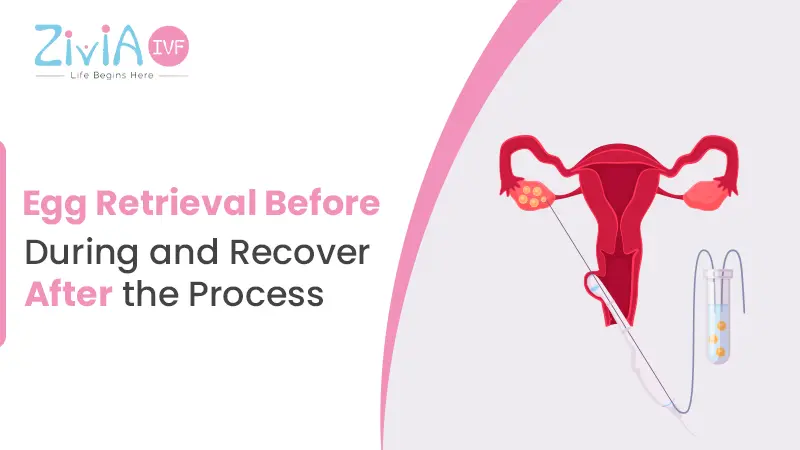
Are you soon about to undergo egg retrieval / Ovum Pickup in IVF and stressed about the procedure that entails it?
Whether you’re considering or have already begun the process of egg freezing, embryo cryopreservation, or in vitro fertilization (IVF), the prospect of egg retrieval may leave you feeling unsure and overwhelmed. While it is a crucial part of your fertility journey, egg retrieval is a routine and very safe procedure.
What happens in an egg retrieval process?
Under twilight general anesthesia, the egg retrieval procedure takes 10-20 minutes. So, you’ll be able to breathe normally without the assistance of a machine. But don’t be concerned! You will be unable to feel or recall anything that occurs during the procedure.
Your doctors will perform a transvaginal ultrasound during the procedure to locate the ovary. A needle is then inserted into the vagina over the ultrasound transducer. The needle will be used by the doctor to suction out the eggs from the stimulated follicles. After the procedure, the eggs will be immediately stored according to your specifications.
What happens before the egg retrieval process?
You might have probably heard that female infants carry egg cells that will be released when they reach sexual maturity. Nonetheless, not all of the eggs are used.
During natural process of ovulation, usually one egg matures at a time in one of the ovaries and is then released. In IVF, there is a need to produce more eggs than usual so that they can all be extracted at once during the egg retrieval process. As a result, our doctor will administer medications to you, either orally or via injection. These medications will assist your body in producing and maturing multiple eggs. Preventing premature ovulation may also necessitate the use of medication.
So, if you’re thinking about freezing your eggs, before starting your injections, you should:
- Increase your protein intake, especially with healthy fish. If you are vegetarian, then pulses, sprouted beans along with fiber diet will be useful.
- Consume whole foods rich in fruits and vegetables.
- Reduce any foods that may cause inflammation or poor nutrition.
- Avoid drinking and smoking
Consult our doctor to know if you need to start off with a prenatal vitamin course.
What happens during the procedure?
During the retrieval, our fertility specialist will have a look at the snapshot of your egg health from the previous few weeks.
The anesthesiologist begins the egg retrieval procedure by administering light intravenous sedation for your comfort. After seizing you, your surgeon will use an ultrasound probe to locate the ovarian follicles. The surgeon will then insert a tiny hollow needle, attached to a catheter with suction capabilities, through the vaginal wall into the ovary and suction the fluid out from the follicles containing the developed eggs.
The follicular fluid containing the eggs is collected in test tubes labeled with your name using light suction. Once collected, eggs are immediately taken to the IVF lab, where the embryologist will locate, isolate and place your eggs in media for a few hours before freezing or fertilization. The actual time required to locate and retrieve eggs is only 5-15 minutes.
You must remember that, as previously stated, the actual egg retrieval procedure is a brief outpatient procedure. Most women find the procedure to be painless, with only minor cramping or discomfort afterwards. After the procedure, you’ll be given a few hours to recover before being sent home to rest.
What happens after the procedure?
As told before, the actual time required to locate and retrieve eggs is only 5-15 minutes. There are no stitches or incisions. Because of the anesthesia, you would not feel or remember anything during the egg retrieval procedure.
Once the retrieval is complete, the anesthesiologist will gently awaken you and transfer you to a recovery room, where you will be monitored frequently. It usually takes 5-10 minutes to come out of sedation and about 2 hours to recover completely. You will be asked to pass urine, have something to eat and drink, before sending you home. Please make arrangements for someone else to drive you home, as you are advised not to drive within 24 hours of the procedure.
Recovery after the process of egg retrieval in IVF
We advise those who are having an egg retrieval to rest on the day of the procedure. Relax at home by catching up on your favorite series or watching a movie. Unless there are any complications, you should be able to resume work the following day.
You can expect some pain after egg retrieval, such as bloating, mild soreness in the vaginal area, slight abdominal cramping or spotting that may last a few days. However, OTC pain relievers can help reduce the pain and discomfort. The majority of women feel normal the next day. Make sure to attend your follow-up appointment and in case you feel anything unusual or any sort of bloating, you must report it to your doctor immediately.
Trust Zivia IVF for a seamless process of egg retrieval in IVF
Are you ready to learn more about egg retrieval and how it can help you achieve your fertility goals? We, Zivia IVF, are here to assist you!
Request an appointment with our team of experts when you’re ready to get a more customized understanding of your unique situation and family planning goals. We’ll be right beside you to help you every step of the way!
